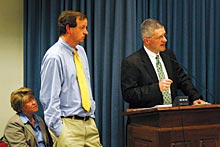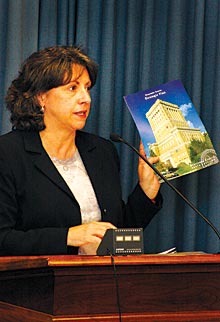In the wake of some very harsh criticism concerning the contaminated former CTS site, the Buncombe County commissioners defended their handling of the issue.

At the Board of Commissioners’ March 25 meeting, many residents of the Mills Gap Road area had said the board hadn’t done enough and had turned a deaf ear to their complaints.
But those barbs spurred a response at the commissioners’ April 8 meeting, when they bought in Environmental Health Director Marc Fowler to explain the county’s actions in the CTS case.
Currently, the U.S. Environmental Protection Agency and the state Department of Environment and Natural Resources are conducting water and health assessments of the area around the site.
“What this will do is identify individuals who are exposed one way or another,” Fowler explained. “The end goal is to take people exposed to contaminants out of that situation, whether it’s getting them off of ground water if it’s drinking water, or addressing soil vapor around the community.”
Once the health assessment is complete, said Fowler, it will be presented to the public, though it’s unclear how soon that might happen.
County health officials, he added, are coordinating their efforts with the state and federal agencies involved.
“I think all of us have been to public hearings where there are a lot of questions about responsibility,” noted Vice Chair David Gantt. “So who is responsible?”
“We don’t really have one-stop shopping with a board of experts you can approach,” Fowler replied. “I know everyone’s desperate for answers, and we’re trying to move to that place.”
He added that DENR has responsibility for ground water, and the EPA handles vapors.
“So we couldn’t get involved if we wanted to because, under law, it’s the state that takes care below the ground and EPA handles above?” Gantt asked.
Assistant County Attorney Michael Frue agreed, adding that the law “really limits the steps we can take, and I know it seems to people like this is taking a long time.”
CTS, which owns the site, has been complying with the steps DENR and the EPA have directed them to take. The company has hired MACTEC, an environmental consulting firm, to help fix the problems, noted Fowler.
“I’m sure if you asked the current owners, they’d say they’re doing everything they can to comply with the current order,” said Frue.
Respect your elders
by Kent Priestley
Let’s face it, folks: We’re not getting any younger. As the baby boom generation begins to retire, the Asheville area is graying, and the trend will probably accelerate during the next few decades. By 2030, Buncombe County is projected to have 285,000 residents (up from about 222,000 now)—nearly a third of whom will be 60 or older.
That shift will have major consequences for our community, from the need for expanded social services and health care to architectural-design changes to accommodate older people’s needs.
At their April 8 meeting, the Buncombe County commissioners heard a report from the Buncombe County Livable and Aging-Friendly Community Planning Task Force. The name may be a bit windy, but its message is crucial, says Joe Connolly, director of the Land-of-Sky Regional Council’s Area Agency on Aging. Connolly is one of 60 members serving on the task force.
“I don’t think we’re prepared for this change, the magnitude of it,” he says. “And that’s not just Buncombe County—I’m speaking of us as a nation in general.”
While the nation faces its own challenges of an aging work force and the question of how it will pay for Social Security and health care for the growing ranks of elderly, in Buncombe County the situation is no less urgent. On average, the county’s population is already 7 percent older than that of the rest of the state—a fact attributable, in part, to Asheville’s popularity as a retirement destination.
Looking after an aging population, the task force notes, requires a health system that offers expanded geriatric care, a job market that sees the merits of older employees, housing that encourages independence, and a safe and extensive public transportation system. The coming demographic shift may even affect the way we have fun, Connolly suggests.
“Our older adults don’t like to travel downtown at night to see the symphony,” he says. “So is it possible for something like that to take place at different times? Those are the questions we need to ask ourselves.”
The report—which the board unanimously approved—includes 116 recommendations for making Asheville and Buncombe County what Connolly calls an “aging-friendly” community.
Now comes the hard part: acting on them.
“As they say, ‘A plan is just a plan,’” notes Connolly.
And though the county is not the lead agency in the situation, Fowler said that if contamination shows up in any other residents’ wells, the Health Department will help ensure that they’re provided with city water. This has already been done with two homes in the area, he noted.
Assistant County Manager Mandy Stone, who’s overseeing the effort, said that county officials are passing along questions raised by members of the public to the agencies handling the matter. The newly convened CTS Citizens Monitoring Council, made up of concerned residents, will soon be doing the same, she added.
“We’re arranging for everyone involved in the assessments to meet with them directly,” noted Stone. “We also continue to test wells outside the one-mile radius [surrounding the plant] at the request of residents.”
Gantt, meanwhile, said the county is “riding herd on the state and federal people to make sure they do what they’re supposed to. We’ll continue to test anyone’s well, and we set up a citizens’ board—not even asked to by the EPA—because we thought it was important that they get the information straight from the horse’s mouth.”
Board Chair Nathan Ramsey added: “A lot of people out there are concerned, and justifiably so. Hopefully we’ll know some more in a short period of time.”
A park around the bend
On the heels of Haw Creek residents’ successful bid for county assistance in creating a new park in their neighborhood, the Bent Creek community came before the board with their own park request, though their approach was radically different.
Rather than asking for a big chunk of money to buy property, Bent Creek residents—who had already cleaned up a vacant, 22-acre county-owned property off Idlewood Drive—merely wanted to confirm their long-standing use of it with a lease. And while the Haw Creek Park took three months to win the commissioners’ final approval, this vote was quick and unanimous, granting the group a five-year lease for $1 a year.
“It serves as a hub both geographically and socially,” explained Mike Turner, speaking for the Bent Creek Community Park Assocation. “It’s promoted a lot of people to be proactive.” The group has spearheaded renovation of the site and installed playground equipment bought with money raised from yard sales and private donations.
Commissioner David Young praised the project as “one of those good-news stories—and a great partnership.” Gantt, meanwhile, hailed it as “an example for other communities.”
Enka resident Jerry Rice said he hopes the county’s Parks and Recreation Department will help the community find grants and provide services for the park.
Don Yelton, who’s seeking a seat on the Board of Commissioners, also got in on the act, calling the park “the prime example of the community taking the initial effort. I suggest in your Parks & Rec plan of the future, that needs to be the necessary element. You can’t make people want something—let them come to you first.”
Tomorrow and tomorrow and tomorrow…
County planning staff are looking 12 years out, said County Manager Wanda Greene as she presented the county’s Buncombe 2020 plan. The document calls for bringing in manufacturing jobs that are hard to ship overseas, creating more green space, preserving agriculture, reducing the dropout rate to zero, and promoting affordable housing. The commissioners unanimously approved the plan.

“One of the major steps,” said Greene, “is to consider the density, the utilities, the road capacity and the environmental impact of any development decision we make.” A master plan for utilities in the county is in the works, she noted.
Another key component, said Greene, is aligning educational programs with local employment opportunities, so that “students can move from the classroom, with scholarships and family support, into good-paying jobs.”
Affordable housing—the focus of another plan that will be unveiled soon—will be tackled via a series of incentives for developers, said Greene.
“I think this is a really solid [overrall] plan and gives us good direction for the next few years,” she observed.
“We already have the best county in the state,” declared Commissioner Bill Stanley, who’s served on the board for 20 years, “and this will just keep it that way.” Stanley, one of four current board members seeking re-election this year, helped craft the plan.
In other business, the board unanimously approved a tax-increment-financing district for the town of Woodfin.
The controversial tool was narrowly approved by state voters in 2004. The current measure allows Woodfin to borrow money—in the form of county-issued bonds—to help finance an ambitious plan to create a central business district. The money, borrowed against the projected increase in property-tax revenues, will fund needed infrastructure, such as roads and sewer lines, for the project.
The developer—in this case, Reynolds Mountain—will pay off the bonds. And if they defaulted, noted Frue, the county would have priority among the creditors.
Before the meeting, Swannanoa resident Eric Gorny reminded the commissioners that “Amendment 1 [the state ballot measure that authorized TIF districts via a referendum] didn’t pass in Buncombe County.”
But Ramsey replied, “I think this can be a good tool, and this is exactly the right use for it.”


ummm, no one, it seems to me